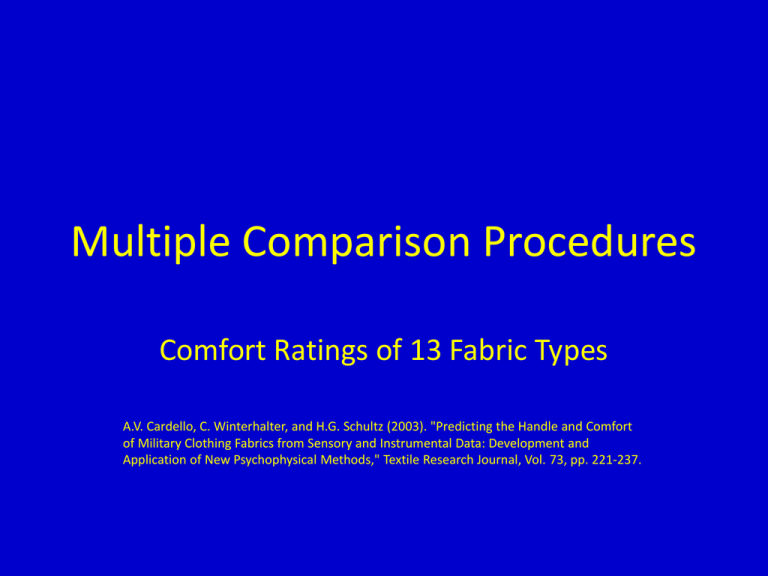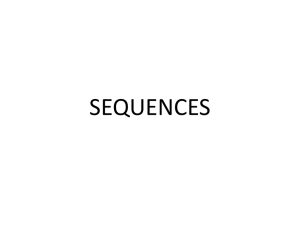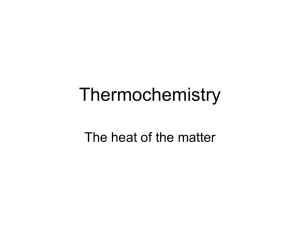Comfort Ratings for 13 Fabric Types
advertisement

Multiple Comparison Procedures
Comfort Ratings of 13 Fabric Types
A.V. Cardello, C. Winterhalter, and H.G. Schultz (2003). "Predicting the Handle and Comfort
of Military Clothing Fabrics from Sensory and Instrumental Data: Development and
Application of New Psychophysical Methods," Textile Research Journal, Vol. 73, pp. 221-237.
Treatments
Means and standard deviations of 45 comfort ratings for 13 military
fabrics. Fabric types:
10R - 50/50 Nylon/combed cotton, ripstop poplin weave
11A - 50/50 Nylon/Polyester, oxford weave (Australian)
12T - 50/50 Nylon/cotton, twill weave
13P - 92/5/3 Nomex/Kevlar/P140, plain weave
14N - 100 Cotton (former flame retardant treated)
15B - 77/23 Cotton sheath/synthetic core, twill (UK)
16C - 100 combed cotton, ripstop poplin (former hot weather BDU)
17C - 65/35 Wool/Polyester, plain weave (Canada-unlaundered)
18L - 65/35 Wool/Polyester, plain weave (Canada-laundered)
19N - 92/5/3 Nomex/Kevlar/P140, oxford weave
20J - Carded cotton sheath/nylon core, plain weave (Canada)
124 - 100 Pima cotton ripstop poplin (experimental)
176 - 50/50 Nylon carded cotton ripstop poplin weave
Multiple Comparisons
•
•
•
•
•
•
•
Individual & Combined Null Hypotheses (H0 H01… H0k)
Comparisonwise Error Rate Pr(Reject H0i|H0i True)
Experimentwise Error Rate Pr(Reject any H0i|All H0i True)
False Discovery Rate E(# False Rejects/Total Rejections)
Strong Familywise Error Rate Pr(Any False Discoveries)
Simultaneous Confidence Intervals Pr(All Correct)=1-e
Multiple Comparison Procedures control Type 1 Error Rate
other than per comparison
True State \ Test Result
H0 True
H0 False
Total
FWER=P(V>=1)=1-P(V=0)
FDR=E(V/R)
Do Not Reject H0
U
T
m-R=U+T
Reject H0
V
S
R=V+S
Total
m0
m-m0
m
Data and Analysis of Variance
Fabric
18L
17C
176
124
20J
16C
12T
14N
19N
10R
13P
15B
11A
Sum
ANOVA
Source
Fabric
Error
Total
df
12
572
584
Mean
-9.8
-1.4
2.4
9.8
10.9
22.0
23.6
24.2
28.5
28.9
37.4
46.4
47.2
#N/A
SD
44.8
40.3
29.4
25.0
31.0
26.2
27.1
30.8
36.1
25.7
25.3
22.5
27.8
#N/A
n
45
45
45
45
45
45
45
45
45
45
45
45
45
585
SS
MS
172053.6 14337.80
542689.8 948.76
714743.4
AllMean
18.575
18.575
18.575
18.575
18.575
18.575
18.575
18.575
18.575
18.575
18.575
18.575
18.575
#N/A
F
15.11
SS(TRT)
36231.33
17955.03
11773.38
3465.028
2650.753
527.8781
1136.278
1423.828
4432.753
4797.253
15947.13
34840.38
36872.58
172053.6
SS(ERR)
88309.76
71459.96
38031.84
27500
42284
30203.36
32314.04
41740.16
57341.24
29061.56
28163.96
22275
34004.96
542689.8
F(.05)
1.769
P-value
0.0000
Bonferroni Based Methods
• Construct P-values for all k test statistics
• Order P-values from smallest p(1) ≤ … ≤ p(k)
Bonferroni: Reject H0(i) if p(i) ≤ e/k
Holm (Controls Strong FWER): Reject H0(i) if p(j) ≤ e/(k-j+1) j ≤ i
False Discovery Rate: Reject H0(i) if p(j) ≤ je/k for some j ≥ i
(Assumes independent tests, not the case for this example)
• Example: Comparing all k=13(12)/2=78 pairs of fabrics
Fabric Example j=1,…,26
Ybar
Hi
47.2
46.4
47.2
46.4
37.4
47.2
46.4
37.4
28.9
28.5
47.2
46.4
47.2
46.4
37.4
24.2
23.6
22
28.9
28.5
37.4
28.9
37.4
28.5
24.2
47.2
Lo
-9.8
-9.8
-1.4
-1.4
-9.8
2.4
2.4
-1.4
-9.8
-9.8
9.8
9.8
10.9
10.9
2.4
-9.8
-9.8
-9.8
-1.4
-1.4
9.8
2.4
10.9
2.4
-1.4
22
HighTrt
11A
15B
11A
15B
13P
11A
15B
13P
10R
19N
11A
15B
11A
15B
13P
14N
12T
16C
10R
19N
13P
10R
13P
19N
14N
11A
LowTrt
18L
18L
17C
17C
18L
176
176
17C
18L
18L
124
124
20J
20J
176
18L
18L
18L
17C
17C
124
176
20J
176
17C
16C
P
1.92281E-17
5.02202E-17
2.73176E-13
6.38303E-13
1.19751E-12
1.39182E-11
3.0811E-11
4.04527E-09
4.42097E-09
6.29464E-09
1.37836E-08
2.73042E-08
3.51693E-08
6.84851E-08
1.03211E-07
2.30981E-07
3.70989E-07
1.26732E-06
3.82636E-06
5.09826E-06
2.49233E-05
5.12351E-05
5.12351E-05
6.61739E-05
9.06917E-05
0.000116266
j
1
2
3
4
5
6
7
8
9
10
11
12
13
14
15
16
17
18
19
20
21
22
23
24
25
26
Holm
.05/(K-j+1)
0.000641
0.000649
0.000658
0.000667
0.000676
0.000685
0.000694
0.000704
0.000714
0.000725
0.000735
0.000746
0.000758
0.000769
0.000781
0.000794
0.000806
0.000820
0.000833
0.000847
0.000862
0.000877
0.000893
0.000909
0.000926
0.000943
FDR
j*.05/K
0.000641
0.001282
0.001923
0.002564
0.003205
0.003846
0.004487
0.005128
0.005769
0.006410
0.007051
0.007692
0.008333
0.008974
0.009615
0.010256
0.010897
0.011538
0.012179
0.012821
0.013462
0.014103
0.014744
0.015385
0.016026
0.016667
Holm
P<.05/(K-j+1)
1
1
1
1
1
1
1
1
1
1
1
1
1
1
1
1
1
1
1
1
1
1
1
1
1
1
FDR
P<j*.05/K
1
1
1
1
1
1
1
1
1
1
1
1
1
1
1
1
1
1
1
1
1
1
1
1
1
1
Bonferroni
P<.05/78
1
1
1
1
1
1
1
1
1
1
1
1
1
1
1
1
1
1
1
1
1
1
1
1
1
1
Fabric Example j=27,…,52
Ybar
Hi
23.6
46.4
47.2
22
47.2
46.4
46.4
24.2
23.6
10.9
9.8
22
28.9
28.5
47.2
47.2
28.9
46.4
28.5
46.4
37.4
24.2
23.6
37.4
24.2
37.4
Lo
-1.4
22
23.6
-1.4
24.2
23.6
24.2
2.4
2.4
-9.8
-9.8
2.4
9.8
9.8
28.5
28.9
10.9
28.5
10.9
28.9
22
9.8
9.8
23.6
10.9
24.2
HighTrt
12T
15B
11A
16C
11A
15B
15B
14N
12T
20J
124
16C
10R
19N
11A
11A
10R
15B
19N
15B
13P
14N
12T
13P
14N
13P
LowTrt
17C
16C
12T
17C
14N
12T
14N
176
176
18L
18L
176
124
124
19N
10R
20J
19N
20J
10R
16C
124
124
12T
20J
14N
P
0.000131479
0.000189193
0.000303797
0.000341271
0.000429581
0.000481366
0.000673894
0.000839827
0.001161089
0.001512166
0.002654749
0.002654749
0.003400107
0.004128893
0.004128893
0.004997148
0.005753551
0.006027804
0.006922844
0.00724678
0.018043298
0.026976865
0.034000896
0.034000896
0.040999764
0.042537508
j
27
28
29
30
31
32
33
34
35
36
37
38
39
40
41
42
43
44
45
46
47
48
49
50
51
52
Holm
.05/(K-j+1)
0.000962
0.000980
0.001000
0.001020
0.001042
0.001064
0.001087
0.001111
0.001136
0.001163
0.001190
0.001220
0.001250
0.001282
0.001316
0.001351
0.001389
0.001429
0.001471
0.001515
0.001563
0.001613
0.001667
0.001724
0.001786
0.001852
FDR
j*.05/K
0.017308
0.017949
0.018590
0.019231
0.019872
0.020513
0.021154
0.021795
0.022436
0.023077
0.023718
0.024359
0.025000
0.025641
0.026282
0.026923
0.027564
0.028205
0.028846
0.029487
0.030128
0.030769
0.031410
0.032051
0.032692
0.033333
Holm
P<.05/(K-j+1)
1
1
1
1
1
1
1
1
0
0
0
0
0
0
0
0
0
0
0
0
0
0
0
0
0
0
FDR
P<j*.05/K
1
1
1
1
1
1
1
1
1
1
1
1
1
1
1
1
1
1
1
1
1
1
0
0
0
0
Bonferroni
P<.05/78
1
1
1
1
1
1
0
0
0
0
0
0
0
0
0
0
0
0
0
0
0
0
0
0
0
0
Fabric Example j=53,…,78
Ybar
Hi
23.6
10.9
2.4
22
9.8
22
47.2
46.4
37.4
10.9
37.4
-1.4
9.8
28.9
28.5
28.9
28.5
28.9
28.5
2.4
24.2
23.6
10.9
47.2
24.2
28.9
Lo
10.9
-1.4
-9.8
9.8
-1.4
10.9
37.4
37.4
28.5
2.4
28.9
-9.8
2.4
22
22
23.6
23.6
24.2
24.2
-1.4
22
22
9.8
46.4
23.6
28.5
HighTrt
12T
20J
176
16C
124
16C
11A
15B
13P
20J
13P
17C
124
10R
19N
10R
19N
10R
19N
176
14N
12T
20J
11A
14N
10R
LowTrt
20J
17C
18L
124
17C
20J
13P
13P
19N
176
10R
18L
176
16C
16C
12T
12T
14N
14N
17C
16C
16C
124
15B
12T
19N
P
0.050978985
0.058706891
0.060784417
0.060784417
0.085108937
0.08792458
0.131806304
0.166294081
0.171044456
0.191067415
0.191067415
0.196333249
0.254937943
0.288419882
0.317258191
0.414733355
0.450807179
0.469491888
0.508116877
0.558650627
0.734889019
0.805464205
0.86554415
0.901993639
0.926413823
0.950903718
j
53
54
55
56
57
58
59
60
61
62
63
64
65
66
67
68
69
70
71
72
73
74
75
76
77
78
Holm
.05/(K-j+1)
0.001923
0.002000
0.002083
0.002174
0.002273
0.002381
0.002500
0.002632
0.002778
0.002941
0.003125
0.003333
0.003571
0.003846
0.004167
0.004545
0.005000
0.005556
0.006250
0.007143
0.008333
0.010000
0.012500
0.016667
0.025000
0.050000
FDR
j*.05/K
0.033974
0.034615
0.035256
0.035897
0.036538
0.037179
0.037821
0.038462
0.039103
0.039744
0.040385
0.041026
0.041667
0.042308
0.042949
0.043590
0.044231
0.044872
0.045513
0.046154
0.046795
0.047436
0.048077
0.048718
0.049359
0.050000
Holm
P<.05/(K-j+1)
0
0
0
0
0
0
0
0
0
0
0
0
0
0
0
0
0
0
0
0
0
0
0
0
0
0
FDR
P<j*.05/K
0
0
0
0
0
0
0
0
0
0
0
0
0
0
0
0
0
0
0
0
0
0
0
0
0
0
Scheffe’s Method for All Contrasts
• Can be used for any number of contrasts, even those
suggested by data. Conservative (Wide CI’s, Low Power)
t
C ki i
i 1
^
t
C ki y i
i 1
t
t
s.t. ki 0
i 1
k
^
SE C MSE i
i 1 ri
H 0 : ki i
i 1
t
2
t
H A : ki i
i 1
^
t test : Test Stat : tobs
C
^
SE C
F test ( 0 : Test Stat:Fobs
Reject H 0 if tobs (t 1) Fe ,t 1,
^
C
2
ki2
MSE
i 1 ri
t
df Error
Reject H 0 if Fobs (t 1) Fe ,t 1,
^
Simultaneous (1 e 100% Confidence Intervals: C (t 1) Fe ,t 1,
ki2
MSE
i 1 ri
t
Example – Scheffe’s Method – All Pairwise Tests/CIs
i j ki 1, k j 1, km 0 m i, m j
1 1
1
1
^
C Y i Y j SE C MSE 948.76 6.49
r r
45 45
j
i
H 0 : i j 0 H A : i j 0
^
Reject H 0 if Y i Y j (t 1) Fe ,t 1, N t
1 1
MSE MSDij
r r
j
i
1
(e 0.05 MSDij (t 1) Fe ,t 1, N t MSE
ri
Fabric
18L
17C
176
124
20J
16C
12T
14N
19N
10R
13P
15B
11A
Mean
-9.8
-1.4
2.4
9.8
10.9
22.0
23.6
24.2
28.5
28.9
37.4
46.4
47.2
15B
11A
1
(13 1)(1.769)(6.49) 29.92
rj
Simultaneous 95% Confidence Intervals:
(
1 1
Y i Y j (t 1) Fe ,t 1, N t MSE
r r
j
i
Fabric
18L
17C
176
124
20J
16C
(Y
12T
i
Y j 29.92
14N
19N
10R
13P
Tukey’s Method for All Pairwise Comparisons
• Makes use of the Studentized Range Distribution
• Pr{(max(Y1,…,Yn)-min(Y1,…,Yn))/S ≥ q(a,n,)} = a
• {Y1,…,Yn } S degrees of freedom for S
(
(
max Y 1 ,..., Y t min Y 1 ,..., Y t
Pr
q ( e , t , 1 e
MSE r
Y i Y j
Pr
q ( e , t , 1 e i, j
MSE r
Tests of H 0(i , j ) : i j i j 0 :
Reject H 0(i , j ) if Y i Y j q ( e , t , MSE r
Approximate test for unequal sample sizes: Reject H 0(i , j ) if Y i Y j
Simultaneous (1 e 100% Confidence Intervals:
(Y
(Y
i
Y j q ( e , t , MSE r
i
Y j
q ( e , t ,
2
Equal Sample Sizes
1 1
MSE
r r
j
i
Unequal Sample Sizes
q ( e , t ,
2
1 1
MSE
r r
j
i
Tukey’s Method for All Pairwise Comparisons
Tests of H 0(i , j ) : i j i j 0 :
Reject H 0(i , j ) if
Y i Y j q ( e , t , MSE r HSDi , j
HSDi , j q ( 0.05,13,585 13 948.76/45
4.70(4.59) 21.58
Fabric
18L
17C
176
124
20J
16C
12T
14N
19N
10R
13P
15B
11A
Mean
-9.8
-1.4
2.4
9.8
10.9
22.0
23.6
24.2
28.5
28.9
37.4
46.4
47.2
Simultaneous 95% Confidence Intervals:
(Y
Fabric
i
Y j 21.58
18L
17C
176
124
20J
16C
12T
14N
19N
10R
13P
15B
11A
Bonferroni’s Method for All Pairwise Comparisons
• Adjusts type I error rate for each test to e/(# of tests)
• Increases Confidence levels of CI’s to (1-(e/(# of CIs)))
Tests of H 0(i , j ) : i j i j 0 : k # of tests/CIs
Reject H 0(i , j ) if Y i Y j t e
2k
,
1 1
MSE
r r
j
i
Equivalently, Reject H 0(i , j ) if P-value
e
k
Simultaneous (1 a 100% Confidence Intervals:
(Y
i
Y j t e
2k
,
1 1
MSE
r r
j
i
Bonferroni’s Method for All Pairwise Comparisons
Tests of H 0(i , j ) : i j i j 0 :
Reject H 0(i , j ) if
Y i Y j t e
2k
MSDi , j t 0.05
2(78)
,
1 1
MSE MSDi , j
r r
j
i
1
1
948.76 3.43(6.49) 22.29
45 45
Fabric
18L
17C
176
124
20J
16C
12T
14N
19N
10R
13P
15B
11A
Mean
-9.8
-1.4
2.4
9.8
10.9
22.0
23.6
24.2
28.5
28.9
37.4
46.4
47.2
Simultaneous (1 a 100% Confidence Intervals:
(Y
i
Fabric
Y j 22.29
18L
17C
176
124
20J
16C
12T
14N
19N
10R
13P
15B
11A
SNK Method for All Pairwise Comparisons
• Controls False Discovery Rate at e
• Uses Different Critical Values for different ranges of means
Tests of H 0(i , j ) : (i ) ( j ) 0 : where Y (1) ... Y (t )
i j
Reject H 0(i , j ) if
1 1
q(e , k , )
Y ( i ) Y ( j )
MSE
k i j 1
r r
2
j
i
Start with largest "stretch" and work down, if fail to reject for one
"stretch" do not test those "beneath" it
SNK Method for All Pairwise Comparisons
Tests of H 0( i , j ) : ( i ) ( j ) 0 :
where Y (1) ... Y ( t )
i j
Reject H 0( i , j ) if
Y ( i ) Y ( j )
MSDk
Fabric
1 1
q (e , k , )
MSE MSDk
r r
2
j
i
k i j 1
q (e , k , )
1 q(e , k , )
1
948.76
(6.49)
2
2
45 45
18L
17C
176
124
20J
16C
12T
14N
19N
10R
13P
15B
11A
k
2
3
4
5
6
7
8
9
10
11
12
13
q(.05,k,inf) q*SE/sqrt(2)
2.772
12.73
3.314
15.22
3.633
16.68
3.858
17.71
4.03
18.50
4.17
19.15
4.286
19.68
4.387
20.14
4.474
20.54
4.552
20.90
4.622
21.22
4.685
21.51
Fabric
18L
17C
176
124
20J
16C
12T
14N
19N
10R
13P
15B
11A
Mean
-9.8
-1.4
2.4
9.8
10.9
22.0
23.6
24.2
28.5
28.9
37.4
46.4
47.2
SNK Method for All Pairwise Comparisons
Low Type \k
18L
17C
176
124
20J
16C
12T
14N
19N
10R
13P
15B
Fabric
18L
13
57.0
12.0
56.2
48.6
17C
11
47.2
47.8
44.8
176
10
38.7
38.8
44.0
37.4
124
9
38.3
30.3
35.0
36.6
36.3
20J
8
34.0
29.9
26.5
27.6
35.5
25.2
16C
7
33.4
25.6
26.1
19.1
26.5
24.4
23.6
12T
6
31.8
25.0
21.8
18.7
18.0
15.4
22.8
23.0
14N
5
20.7
23.4
21.2
14.4
17.6
6.9
13.8
22.2
18.7
19N
4
19.6
12.3
19.6
13.8
13.3
6.5
5.3
13.2
17.9
18.3
10R
3
12.2
11.2
8.5
12.2
12.7
2.2
4.9
4.7
8.9
17.5
9.8
k
2
3
4
5
6
7
8
9
10
11
12
13
2
8.4
3.8
7.4
1.1
11.1
1.6
0.6
4.3
0.4
8.5
9.0
0.8
13P
15B
11A
q(.05,k,inf) q*SE/sqrt(2)
2.772
12.73
3.314
15.22
3.633
16.68
3.858
17.71
4.03
18.50
4.17
19.15
4.286
19.68
4.387
20.14
4.474
20.54
4.552
20.90
4.622
21.22
4.685
21.51
Fabric
18L
17C
176
124
20J
16C
12T
14N
19N
10R
13P
15B
11A
Mean
-9.8
-1.4
2.4
9.8
10.9
22.0
23.6
24.2
28.5
28.9
37.4
46.4
47.2
Fisher’s Protected LSD for All Pairwise Comparisons
• Controls Experimentwise Error Rate at e
• Only Conducted if F-test is significant (P-value ≤ e
Tests of H 0( i , j ) : i j 0 :
Reject H 0( i , j ) if
Y i Y j te /2,
1 1
MSE
r r
j
i
Fisher’s Protected LSD for All Pairwise Comparisons
Tests of H 0(i , j ) : i j 0 :
Reject H 0( i , j ) if
1 1
MSE MSDij
r r
j
i
Y i Y j te /2,
MSDij t.025,572
Fabric
18L
17C
1
1
948.76 1.96(6.49) 12.72
45 45
176
124
20J
16C
12T
14N
19N
10R
13P
Fabric
18L
17C
176
124
20J
16C
12T
14N
19N
10R
13P
15B
11A
Mean
-9.8
-1.4
2.4
9.8
10.9
22.0
23.6
24.2
28.5
28.9
37.4
46.4
47.2
15B
11A
Multiple Comparisons with Best Treatment/Control
• Pr{subset of treatments contains the best} = 1- e
Case where higher means are good:
Subset consists of all treatments i such that:
1 1
Y i Y j de (t 1, ) MSE i, j
r r
j
i
'
de' (t 1, ) are 1-sided critical values from Dunnett's t-table
Case where lower means are good:
Subset consists of all treatments i such that:
1 1
Y i Y j de (t 1, ) MSE i, j
r r
j
i
'
Multiple Comparisons with Best Treatment/Control
Case where higher means are good:
Subset consists of all treatments i such that:
1 1
Y i Y j de (t 1, ) MSE i, j
r r
j
i
'
Y i Y j d
'
0.05
1
1
(12,572) 948.76 i, j
45 45
Fabric
18L
17C
176
124
20J
16C
12T
14N
19N
10R
13P
15B
11A
Y i Y j 2.50(6.49) Y i Y j 16.22
Treatments 13P, 15B, and 11A all lie within 16.22 of the highest mean
Mean
-9.8
-1.4
2.4
9.8
10.9
22.0
23.6
24.2
28.5
28.9
37.4
46.4
47.2







